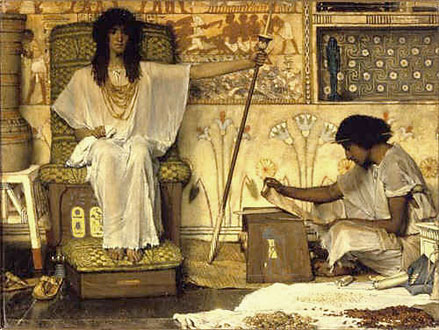Backseat Driver
The Pharisees’ call for miracles from Jesus was a sign of immaturity. As the story of the patriarchs demonstrates, the growing maturity of the people of God is illustrated in less of a need for proofs. The Word is enough. Miracles are occurring around the world in places where the gospel is new and faith needs assurance. In the West, genuine miracles of this nature seldom occur. Is it due to a lack of faith or a call to greater faith? We have had the Scriptures forever, and the childish desire for (and manufacturing of) miracles, betrays a reversion to childhood.
Abraham was the first patriarch, but both Jacob and Joseph did greater deeds. Jordan observes that neither Abraham nor Jacob could have conquered Egypt the way Joseph did.
Abraham founds the new Garden, planting oak trees (Father). Jacob’s trials concern relatives and brothers (Land – Son). Joseph is plunged into the Gentile Sea, the World. Joseph was most likely the first Spirit-filled man.
“…altars and sacrifices play a large role in the Abraham narrative (Genesis 11:27–25:11), little role in the story of Jacob (25:12–37:1), and no role in the history of Joseph (37:2–50:26). We now observe that in the story of Abraham, God frequently appears to Abraham (12:1-3; 13:14-17; 15:1-21; 17:1-22; 18:1-33; 22:1-19), while God only appears four times to Jacob in the Jacob story (28:10-17; 31:10-13; 32:24-30; 35:10-13), and once later on in the Joseph story (46:1-4). The Abraham narrative reads like an extended life-long dialogue between Abraham and Yahweh, and indeed, there are several actual dialogues between the two. In the Jacob narrative there are no dialogues, and God appears only at three/four crisis points. God does not personally appear at all in the Joseph story. If there is something to be learned from this fact is it this: As we mature, God chooses to recede further into the background of our lives, and leads us by means of His Spirit. This is an aspect of how He brings us to maturity.” [1]
Blessed are those who have not seen, and yet have believed. Unlike Adam, and like Joseph, we become content to obey the Covenant Word and work faithfully—unsupervised. Even in the valley of the shadow of death, we remember what direction we were facing in and we persevere.
You should still expect miracles, but the Word becomes enough as you grow to maturity. You become Word incarnate so that the “hidden God” is not hidden at all. Like Joseph, you are the altar and the sign.
________________________________________________
[1] James B. Jordan, Crisis Time: Patriarchal Prologue, Part 1, BIBLICAL HORIZONS, No. 109.



























March 7th, 2010 at 4:06 am
I thought it was funny you say Joseph was the first Spirit filled man and don’t mention Genesis 41:38
And Pharaoh said to his servants, “Can we find a man like this, in whom is the Spirit of God?”
March 7th, 2010 at 9:42 am
Robert
Yes of course, but I doubt Pharaoh meant it in a “post-Pentecost” sort of way, which is the point. Joseph is a microcosm of church history.
The contrast is (mostly) between Abraham and Joseph. The Spirit of God was also in Abraham. But Joseph, standing upon his great grandfather’s shoulders and “filled” with the Spirit, shows greater maturity. It was his interpretation and wisdom (neither overtly miraculous) that brought this comment from Pharaoh. God was working behind the scenes as He did in Esther, and as He mostly does with us.